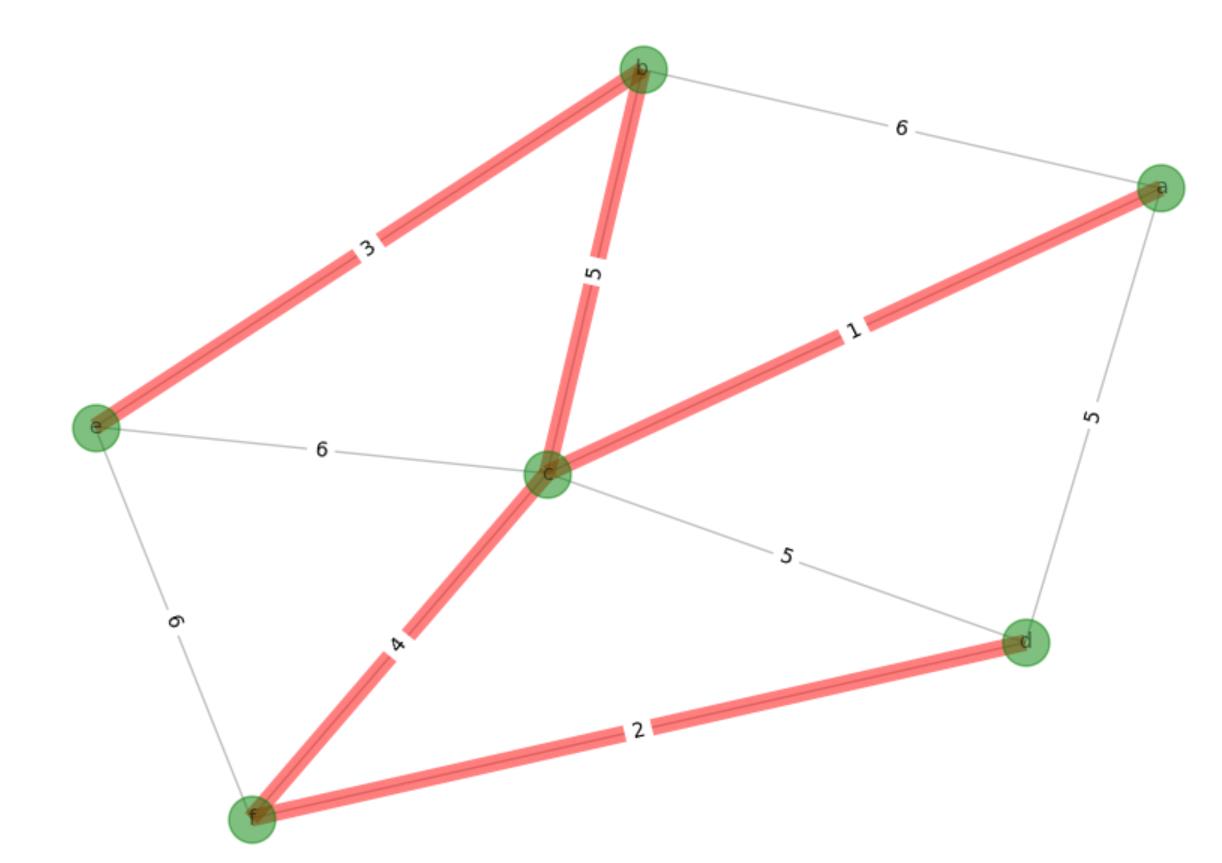networkx图论Kruskal Algorithm最小生成树,Python
Posted zhangphil
tags:
篇首语:本文由小常识网(cha138.com)小编为大家整理,主要介绍了networkx图论Kruskal Algorithm最小生成树,Python相关的知识,希望对你有一定的参考价值。
Kruskal Algorithm和Prim最大的差异是Kruskal Algorithm是基于权边的。Kruskal Algorithm以权边维度,不断迭代加边(最小权边)。Prim是加点(最小权边的点)的。
Kruskal Algorithm每次遍历所有边权的值,每次取最小的权边,生成树枝。不一定在算法启动前期边一定连通,可以是孤立存在的非邻接边。已经加入树的边不需要重复遍历。注意图中的边很可能存在相同的权,意味着每次检查最小权边时候,返回的是list。取出最小的权边后,当加入树时候,需要检查是否构成了环,如果构成环,则废弃这个边。
当树的边等于图所有节点数减一时候,算法收敛,结束算法。
import networkx as nx
import matplotlib.pyplot as plt
def my_graph():
# 构造一个有权边的无向图,然后找出最小生成树
G = nx.Graph() # 无向图
nodes = ['a', 'b', 'c', 'd', 'e', 'f']
G.add_nodes_from(nodes)
G.add_edges_from([('a', 'b', {'weight': 6}),
('a', 'c', {'weight': 1}),
('a', 'd', {'weight': 5}),
('b', 'c', {'weight': 5}),
('c', 'd', {'weight': 5}),
('b', 'e', {'weight': 3}),
('c', 'e', {'weight': 6}),
('e', 'f', {'weight': 6}),
('c', 'f', {'weight': 4}),
('d', 'f', {'weight': 2})])
pos = nx.spring_layout(G)
nx.draw(G, pos,
node_color='green',
node_size=500,
font_size=10,
font_color='black',
edge_color='gray',
width=1,
alpha=0.5,
with_labels=True)
my_edge_labels = nx.get_edge_attributes(G, 'weight')
nx.draw_networkx_edge_labels(G, pos, edge_labels=my_edge_labels)
print('邻接', list(G.adjacency()))
print('所有边', G.edges())
g_edges = list(G.edges(data=True))
print('所有边权', g_edges)
U = []
V = g_edges.copy()
loop_flag = True
while loop_flag:
print('----------')
me = find_min_edge(V.copy())
for e in me:
U_temp = U.copy()
U_temp.append(e)
G_temp = nx.Graph()
G_temp.add_edges_from(U_temp)
try:
cycle_found = nx.find_cycle(G_temp)
print('连成环了,放弃这个边', cycle_found)
cycle = True
except nx.exception.NetworkXNoCycle:
print('构图没有形成环')
cycle = False
if not cycle:
U.append(e)
V.remove(e)
number_of_edge_temp = G_temp.number_of_edges()
# 如果形成的图的总边==总节点数-1,说明找到的边已经完全cover
if (G.number_of_nodes() - 1) == number_of_edge_temp:
print('生成最小树,算法结束')
loop_flag = False
break
print('U=', U)
print('V=', V)
# 把最小生成树的边着色加粗重新描边
nx.draw_networkx_edges(G, pos,
edgelist=U,
width=8,
alpha=0.5,
edge_color="r")
plt.show()
def find_min_edge(edges):
min_edge_list = []
min_edge = min(edges, key=lambda x: x[2]['weight'])
weight = min_edge[2]['weight']
min_edge_list.append(min_edge)
edges.remove(min_edge)
while True:
if len(edges) == 0:
break
edge = min(edges, key=lambda x: x[2]['weight'])
w = edge[2]['weight']
if w == weight:
min_edge_list.append(edge)
edges.remove(edge)
print('找到最小权边', min_edge_list)
return min_edge_list
if __name__ == '__main__':
my_graph()
如图:

运行日志:
邻接 [('a', {'b': {'weight': 6}, 'c': {'weight': 1}, 'd': {'weight': 5}}), ('b', {'a': {'weight': 6}, 'c': {'weight': 5}, 'e': {'weight': 3}}), ('c', {'a': {'weight': 1}, 'b': {'weight': 5}, 'd': {'weight': 5}, 'e': {'weight': 6}, 'f': {'weight': 4}}), ('d', {'a': {'weight': 5}, 'c': {'weight': 5}, 'f': {'weight': 2}}), ('e', {'b': {'weight': 3}, 'c': {'weight': 6}, 'f': {'weight': 6}}), ('f', {'e': {'weight': 6}, 'c': {'weight': 4}, 'd': {'weight': 2}})]
所有边 [('a', 'b'), ('a', 'c'), ('a', 'd'), ('b', 'c'), ('b', 'e'), ('c', 'd'), ('c', 'e'), ('c', 'f'), ('d', 'f'), ('e', 'f')]
所有边权 [('a', 'b', {'weight': 6}), ('a', 'c', {'weight': 1}), ('a', 'd', {'weight': 5}), ('b', 'c', {'weight': 5}), ('b', 'e', {'weight': 3}), ('c', 'd', {'weight': 5}), ('c', 'e', {'weight': 6}), ('c', 'f', {'weight': 4}), ('d', 'f', {'weight': 2}), ('e', 'f', {'weight': 6})]
----------
找到最小权边 [('a', 'c', {'weight': 1})]
构图没有形成环
U= [('a', 'c', {'weight': 1})]
V= [('a', 'b', {'weight': 6}), ('a', 'd', {'weight': 5}), ('b', 'c', {'weight': 5}), ('b', 'e', {'weight': 3}), ('c', 'd', {'weight': 5}), ('c', 'e', {'weight': 6}), ('c', 'f', {'weight': 4}), ('d', 'f', {'weight': 2}), ('e', 'f', {'weight': 6})]
----------
找到最小权边 [('d', 'f', {'weight': 2})]
构图没有形成环
U= [('a', 'c', {'weight': 1}), ('d', 'f', {'weight': 2})]
V= [('a', 'b', {'weight': 6}), ('a', 'd', {'weight': 5}), ('b', 'c', {'weight': 5}), ('b', 'e', {'weight': 3}), ('c', 'd', {'weight': 5}), ('c', 'e', {'weight': 6}), ('c', 'f', {'weight': 4}), ('e', 'f', {'weight': 6})]
----------
找到最小权边 [('b', 'e', {'weight': 3})]
构图没有形成环
U= [('a', 'c', {'weight': 1}), ('d', 'f', {'weight': 2}), ('b', 'e', {'weight': 3})]
V= [('a', 'b', {'weight': 6}), ('a', 'd', {'weight': 5}), ('b', 'c', {'weight': 5}), ('c', 'd', {'weight': 5}), ('c', 'e', {'weight': 6}), ('c', 'f', {'weight': 4}), ('e', 'f', {'weight': 6})]
----------
找到最小权边 [('c', 'f', {'weight': 4})]
构图没有形成环
U= [('a', 'c', {'weight': 1}), ('d', 'f', {'weight': 2}), ('b', 'e', {'weight': 3}), ('c', 'f', {'weight': 4})]
V= [('a', 'b', {'weight': 6}), ('a', 'd', {'weight': 5}), ('b', 'c', {'weight': 5}), ('c', 'd', {'weight': 5}), ('c', 'e', {'weight': 6}), ('e', 'f', {'weight': 6})]
----------
找到最小权边 [('a', 'd', {'weight': 5}), ('b', 'c', {'weight': 5}), ('c', 'd', {'weight': 5})]
连成环了,放弃这个边 [('a', 'c'), ('c', 'f'), ('f', 'd'), ('d', 'a')]
构图没有形成环
生成最小树,算法结束
U= [('a', 'c', {'weight': 1}), ('d', 'f', {'weight': 2}), ('b', 'e', {'weight': 3}), ('c', 'f', {'weight': 4}), ('b', 'c', {'weight': 5})]
V= [('a', 'b', {'weight': 6}), ('a', 'd', {'weight': 5}), ('c', 'd', {'weight': 5}), ('c', 'e', {'weight': 6}), ('e', 'f', {'weight': 6})]
以上是关于networkx图论Kruskal Algorithm最小生成树,Python的主要内容,如果未能解决你的问题,请参考以下文章